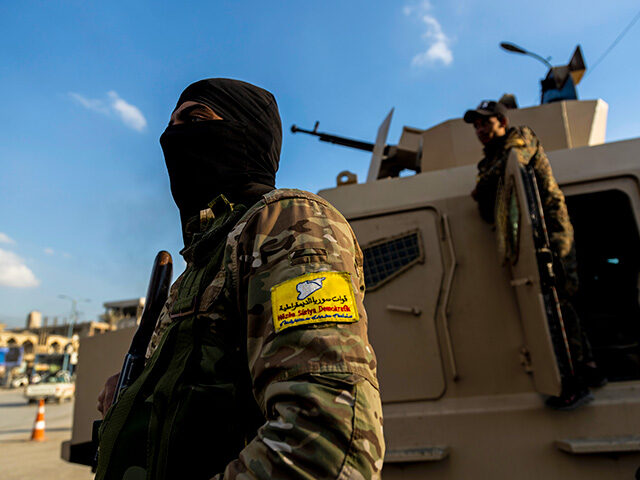Syrian Kurds Say They Stopped Fighting ISIS After Turkish Proxies Attacked
 AP Photo/Baderkhan Ahmad
AP Photo/Baderkhan Ahmad
The head of the Syrian Democratic Forces (SDF), a Kurdish-led militia in the country allied with the United States, said in an interview on Wednesday that his fighters had stopped their efforts against the Islamic State in light of the ongoing assault against Kurds by a Turkish proxy force.
The Turkish-backed Syrian National Army (SNA), a mostly Sunni Arab militia formerly known as the Free Syrian Army, launched a campaign called “Dawn of Freedom” in late November, shortly after an unrelated Sunni militia, Hayat Tahrir al-Sham (HTS), launched a surprise campaign against the regime of longtime dictator Bashar al-Assad. HTS is an al-Qaeda offshoot with ties to the Islamic State that is a U.S.-designated terrorist organization. The FBI is offering a $10 reward for information leading to the capture of its leader, Abu Mohammed al-Jolani.
HTS succeeded in toppling the Assad regime, sending the dictator fleeing to Russia on Saturday. Jolani, now in charge of a “transition” out of the Iran-backed Assad regime, is attempting to rebrand HTS as a moderate organization seeking to build an “inclusive” government, despite its extensive past as a brutal jihadist terror gang.
The HTS victory in Damascus has done nothing to stop the SNA’s assault on the SDF, whose operations were crucial to the destruction of the Islamic State “caliphate” in northern Raqqa, Syria. Reports this week indicated that the Turkish proxy force expelled the SDF from the Kurdish-held city of Manbij and dislodged it from Deir Ezzor, which the SDF occupied for some days in the absence of Assad regime. The SNA campaign has reportedly dislodged at least 120,000 people and triggered international alarms that the jihadists may engage in ethnic cleansing campaigns against Kurdish civilians.
In addition to human rights concerns, SDF commander-in-chief General Mazloum Abdi suggested that the SNA advance has already hindered efforts to prevent the Islamic State from reconstructing their “caliphate.”
“ISIS is now stronger in the Syrian desert. Previously, they were in remote areas and hiding, but now they have greater freedom of movement since they face no issues with other groups and are not engaged in conflict with them,” Abdi said in an interview with the British broadcaster Sky News on Wednesday. “In the areas under our control, their activities have also increased. Just a few days ago, three members of the Internal Security Forces were killed near al Hassakah in an ISIS operation.”
Abdi confirmed that the SDF’s joint operations with America to contain the Islamic State are currently “halted,” and said that he never ordered the end of the operations, nor did the SDF simply choose to stop operating against ISIS.
“This is not a decision but rather a military reality, as the coalition is also preoccupied with the ongoing conflict. Therefore, I stress that if these attacks persist, joint operations will remain suspended,” he explained.
In addition to combatting ISIS cells, the SDF maintains several prison facilities throughout Syria that hold Islamic State jihadists. Abdi warned that ongoing attacks by the Turkish proxy forces could potentially result in the liberation of these terrorists.
“Generally, the effectiveness of our forces and those of the coalition against ISIS diminishes when we are focused on protecting civilians and our communities, as efforts are redirected toward the ongoing conflict” he said. “This is why I say that if the fighting continues and intensifies, it will play into ISIS’s hands.”
“Frankly, there is currently a significant threat to the security of these detention centres,” Abdi warned.
Turkey is a NATO ally, which complicates its relationship to Washington within Syria. The administration of President Joe Biden has done little to condemn the campaign against the SNA and little to support the Kurds. The head of U.S. Central Command (CENTCOM), Army Gen. Erik Kurilla, visited SDF leaders on Tuesday in northern Syria, an apparent sign of support. The Pentagon has dismissed the threat of the SNA liberating ISIS prisoners, however, and claimed it continued to have a “great” relationship with Turkey during a briefing on Wednesday.
“There’s been no change to our partnership with the SDF when it comes to ensuring the defeat of ISIS,” Pentagon Deputy Press Secretary Sabrina Singh told reporters that day. “There’s been no change to our work or partnership with SDF forces. We continue to work with them. General Kurilla, our Central Command Commander was actually in the region engaging with his counterparts. So that work remains ongoing.”
Asked what America is doing to protect its SDF allies, Singh said the Pentagon is “continuing to have conversations.”
“We’re going to continue to engage the SDF. We have ways to deconflict, of course,” she added.
In the absence of a public commitment to protect the SDF from Turkish-backed forces, the SDF appears to be attempting to improve its relationship with HTS. Kurdish officials in Syrian Kurdistan, which the Kurds refer to as Rojava, began flying the Syrian rebel flag rather than the standard flag under Bashar Assad on Thursday. Abdi, the SDF commander, said shortly before HTS entered Damascus that he had no quarrel with HTS forces.
“We have contact with Tahrir al-Sham through many channels, typically regarding the protection of our people in Aleppo. Apparently, we have never clashed with them,” Abdi said at a press conference on Friday, according to the Kurdish outlet Rudaw.
“There is a new situation on the ground. We know that Hayat Tahrir al-Sham has taken away many areas from the Syrian regime,” Abdi continued. “What concerns us is that our region in northeast Syria should not be targeted. If we are attacked we will defend ourselves.”
Follow Frances Martel on Facebook and Twitter.
Source link

